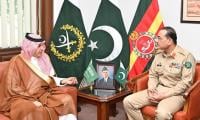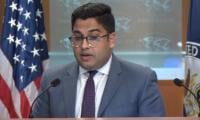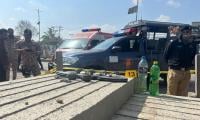Ramallah, Palestinian Territories: The genocidal Israeli campaign in the Middle East recently served to unite the geographically fragmented Palestinian community in a way not seen in years, analysts say.
From the blockaded Gaza Strip to the occupied West Bank and annexed east al-Quds, to Arab living inside the illegal Jewish state, scattered people pulled closer together. A sea of Palestinian flags flew in solidarity rallies, especially during "Day of Rage" protests and a general strike on May 18 that cut across separate areas.
Administrative offices, schools and businesses closed across the West Bank to protest the bloody bombardment of Gaza but also against expanding illegal Jewish settlements in the occupied territories.
In a rare move, the shutters also came down in east al-Quds, the part of the Holy City annexed by Israel, and in Arab population centres such as Nazareth and Acre. "To see every single Palestinian community rise up together, this is extremely rare," said Salem Barahmeh, director of the Palestine Institute for Public Diplomacy.
"To go on a national strike and protest and to have the Palestinian diaspora also involved, that’s pretty historic," he said, referring to rallies by Palestinians abroad. Palestinians have long demanded their own state, with east al-Quds as its capital, but for now the community is fragmented, with each part facing a different reality.
In the latest confrontation, Israeli bombs rained mercilessly down on Gaza, the blockaded coastal enclave of two million ruled by Islamist group Hamas, who had fired rockets at Israel. The escalation was sparked after Israeli police attacked Palestinians at east al-Quds’s Al-Aqsa Mosque compound, one of Islam’s holiest sites.
The ensuing assault also spread to the West Bank, where Israeli forces are largely in charge but the Palestinian Authority led by the secular Fatah movement has limited control. More than 25 Palestinians were killed by Israeli forced in the West Bank. The fragmentation in the region has long served to "ensure that there is no full Palestinian engagement geographically, socially and politically," said Barahmeh, who is based in Ramallah in the West Bank.
While Gaza is mired in poverty, the West Bank after successive intifadas (uprisings) has seen liberal economic policies and the emergence of a middle class that at times seems less politically engaged, he said. Gaza’s rulers Hamas, unlike Fatah, do not recognise Israel and the group is considered a "terrorist" organisation by the US and EU.
"Palestinians are fighting for their legitimacy, to be part of the political system, part of the decision making, in order to lead to a solution to the Palestinian problem." Palestinian President Mahmoud Abbas of Fatah had recently called the first Palestinian elections in 15 years this year.
But he then indefinitely postponed the polls, blaming voting restrictions in annexed east al-Quds, which led Hamas to accuse Abbas of perpetrating a "coup". Despite those divisions, a sense of common Palestinian identity has been strengthened, said Barahmeh.
"You see people coming out together in a unified manner, speaking the same language, ... protesting the same system, projecting the same identity," he said. "Everything we see tells us that there is a form of unity. Is it fully formed? No... But I think it’s the start of something."
Former US president Donald Trump. — AFP NEW YORK: The judge overseeing former US president Donald Trump’s...
Bosnian Serb leader Milorad Dodik. — AFP FileSARAJEVO: The parliament of Bosnia´s autonomous Serb Republic adopted...
Australia's Prime Minister Anthony Albanese speaks during the opening ceremony of the 6th China International Import...
Indonesia's Ruang volcano. — AFP JAKARTA: Indonesia shut a provincial airport and evacuated hundreds of people...
Myanmar’s detained former leader and Aung San Suu Kyi. — AFP LONDON: Myanmar’s detained former leader and Aung...
President Ruto is seen with the chief of the Kenya Defence Forces General Francis Ogolla in this photo on 28 February....







